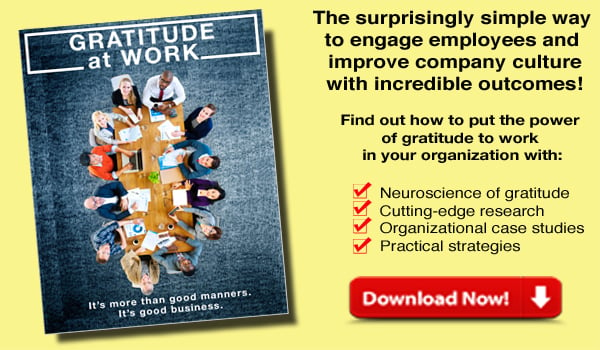For most of us, our days are busy, sometimes hectic and even stressful. Even with the best of intentions, life does not always go as planned. During those times, it’s pretty easy to get weighed down in negativity. Those are the perfect times to practice gratitude.
If you focus on the disappointments, bad news and deficits, your brain will get stuck in what scientists refer to as the vicious cycle – a chain of events continually reinforced through a feedback loop. Each negative event reinforces the previous one. That cycle continues until an intentional positive event disrupts the cycle.
It’s not as if there are actually more negative events than positive events. When we are stuck in the vicious cycle, the brain is so busy searching for the negatives to perpetuate the cycle that we fail to see the good stuff. The mind feasts upon what it focuses on.
Negativity Kills Brain Cells
That negative thought loop does more than just make us grouchy. When we get stuck in the vicious cycle, the limbic system turns on the cortisol tap. An overproduction of cortisol is linked to a host of health issues such as insomnia, high blood pressure, chronic fatigue syndrome, thyroid disorders, and depression. It also weakens the immune system which can result in anything from a common cold to severe life-threatening diseases.
If all of that isn't enough, cortisol shrinks cells and prevents neural generation in the hippocampus – the region responsible for memory, learning and the ability to regulate emotions. Maybe most importantly, it decreases the production of BDNF (brain-derived neurotropic factor) which is a protein that keeps our existing brain cells healthy and promotes the growth of new ones. Think of it as Miracle-Gro for the brain.
Now, for the Good News
Just as we can get stuck in the negative cycle, we can also get stuck in a positive cycle. Neuroscientists refer to this as the virtuous cycle. While its evil twin (vicious cycle) stays focused on the negatives, the virtuous cycle keeps you busy looking for the positives. The virtuous cycle doesn’t magically make good things happen for you; it just tunes your brain into searching for and seeing the good things that are there.
Studies on gratitude have found that gratitude is not a basic emotion of just getting a reward. Rather, the brain activity in that area indicates that gratitude is a complex emotion, built around social interactions, interpersonal bonding, moral judgement, and empathy. The brain does not experience sincere gratitude as a trivial expression. Instead it is an important part of human interactions and connections. The practice of gratitude forces us to look beyond ourselves to connect meaningfully with others.
Recent fMRI studies (functional magnetic resonance imaging) show that gratitude generates increased activity in the hypothalamus, the region that links the nervous system to the endocrine system. It's only about the size of an almond but it’s responsible for some pretty important functions such as body temperature, hunger, thirst, sleeping, metabolic activity and managing stress. In addition, feelings of gratitude directly activate the limbic system and trigger a release of dopamine. Dopamine, the pleasure and reward chemical, is responsible for trying to get that good feeling again. It’s your brain saying, “Oh… that felt good! Do that again!” That shot of dopamine is also what sends your brain into the virtuous cycle.
In addition to dopamine, your brain produces oxytocin when you experience gratitude. Oxytocin – often called the "cuddle drug" – is released when we experience emotional connections with others. The biggest surges come from sex and breast-feeding. However, this neurotransmitter also triggers a host of pro-social behaviors like trust, empathy, and affection. A wealth of studies show that gratitude is a powerful trigger for producing oxytocin. Moreover, we produce more oxytocin when we express gratitude to others than when we receive gratitude.
Just like in our personal lives, a sense of gratitude can improve self-esteem, optimism, a sense of unity, and overall well-being at work. When we extend expressions of gratitude with our colleagues, we create a "pay it forward" chain of positivity that impacts productivity, creativity and the overall culture of the organization. It's called emotional contagion, and it's far more compelling than incentives or contests.
Beyond all of the feel-good chemicals your brain produces when you practice gratitude, being grateful is a form of emotional intelligence. Studies show that people with increased emotional intelligence have a more neural-dense prefrontal cortex. What does that mean? As we make gratitude a daily habit, we build emotional intelligence, and as an added bonus, the part of the brain that handles all of the higher-level executive functions becomes more efficient.
So, on those days that are particularly tough, writing a simple thank you note to someone else or acknowledging the things in your life for which you are grateful is the best way to put your brain in a healthy self-perpetuating cycle.
Smarter and happier? Yes, please!









